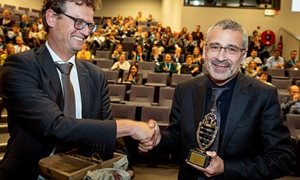30 July 2020
Chronic myeloid leukaemia (CML) is a serious and rare disease. With new, expensive drugs (tyrosine kinase inhibitors), patients can be treated relatively easily and survival is good. However, the majority of patients (for the time being) have to take these drugs for life. This is a major burden because half of the patients experience moderate to severe side effects, which reduce the quality of life.
Reduce side effects & reduce costs
There are indications that the dose of the medication can be safely reduced if the disease is stable. The lower dose reduces the chance and severity of side effects and improves the quality of life. In addition, dose reduction also means that patients need to take less medication. This reduces the cost of treatment (approximately €13,000-€70,000 per patient per year).
Patient-driven phase-out strategy
Under the leadership of Professor Nicole Blijlevens (Hematology) and researcher Charlotte Bekker (Pharmacy), the Department of Haematology and Pharmacy will develop and test a phasing out strategy in CML patients with whom the disease remains stable. Reduction means that the dose of medication will be lowered. The control and decision to reduce the dose is the patient's responsibility, and is therefore patient-driven. By giving the patient (in the home situation) his own direction, the researchers hope to motivate him/her to improve the lifelong use of medication. The disease remains stable, side effects diminish, the quality of life improves at lower drug costs.
The funding falls under the ZonMw programme Good Usage of Medicines.

Chronic myeloid leukaemia (CML) is a serious and rare disease. With new, expensive drugs (tyrosine kinase inhibitors), patients can be treated relatively easily and survival is good. However, the majority of patients (for the time being) have to take these drugs for life. This is a major burden because half of the patients experience moderate to severe side effects, which reduce the quality of life.
Reduce side effects & reduce costs
There are indications that the dose of the medication can be safely reduced if the disease is stable. The lower dose reduces the chance and severity of side effects and improves the quality of life. In addition, dose reduction also means that patients need to take less medication. This reduces the cost of treatment (approximately €13,000-€70,000 per patient per year).
Patient-driven phase-out strategy
Under the leadership of Professor Nicole Blijlevens (Hematology) and researcher Charlotte Bekker (Pharmacy), the Department of Haematology and Pharmacy will develop and test a phasing out strategy in CML patients with whom the disease remains stable. Reduction means that the dose of medication will be lowered. The control and decision to reduce the dose is the patient's responsibility, and is therefore patient-driven. By giving the patient (in the home situation) his own direction, the researchers hope to motivate him/her to improve the lifelong use of medication. The disease remains stable, side effects diminish, the quality of life improves at lower drug costs.
The funding falls under the ZonMw programme Good Usage of Medicines.
Related news items

Cognitive behavioral therapy reduces severe fatigue in patients with advanced cancer during treatment
28 January 2020 In Annals of Oncology, RIHS researchers Hanneke Poort, Marlies Peters, Winette van der Graaf, Ria Nijhuis-van der Sanden and colleagues showed significant effects of cognitive behavioral therapy on fatigue in patients with advanced cancer during treatment with palliative intent. go to page
Bart Kiemeney finishes 1st in the Tour and raises thousands of euros
30 July 2019 With over €47,000 on the counter, Kiemeney can see the Tour de France as a great success. go to page
Internal KWF review procedure 2020
13 June 2019 In agreement with the existing policy the research board and Radboud Center for Oncology have decided to continue with the mandatory internal review procedure for KWF grant applications. go to page
Three Royal decorations for RIHS researchers
29 April 2019 Peter de Smet, Harry Surayapranata and Stans Verhagen received royal honours for their exceptional academic and social achievements. go to page
Report of the 12th New Frontiers symposium Big data, better healthcare? - 1 November 2018
7 November 2018 Examples from the application of deep learning to image reading in pathology and radiology and the application of network medicine to monitor infectious disease outbreaks or collective mood states using twitter data showed the huge potential of big data approaches for building better healthcare. go to page
